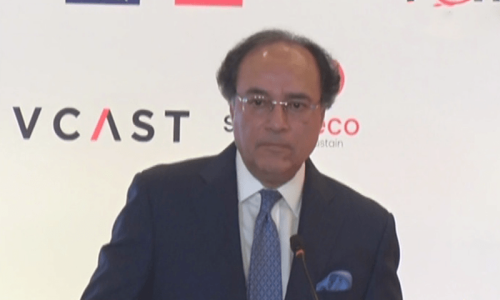ISLAMABAD: In a written rebuttal submitted to the Supreme Court which closed hearing in the Panama Papers case on Thursday, senior counsel Naeem Bokhari has argued that Prime Minister Nawaz Sharif cannot claim immunity under Article 66 of the Constitution in respect of his speech on the floor of the National Assembly on May 16, 2015.
“It is not the object or intent of Article 66 of the Constitution to provide sanctuary, privilege or protection to a member of parliament in respect of an explanation and clarification being given by a member of the parliament in respect to serious allegations of impropriety including concealment of assets made against him,” said the 70-page rebuttal Mr Bokhari submitted on behalf of Pakistan Tehreek-i-Insaf (PTI) chairman Imran Khan.
The document was furnished before the five-judge Supreme Court bench headed by Justice Asif Saeed Khosa by Mr Bokhari on Thursday while closing his rebuttal arguments in the Panama Papers case.
The bench has reserved its judgement which will be announced at a later date to be intimated by the court.
Article 66 deals with the privileges of the members of parliament and ensures complete freedom of speech at the floor of the house that cannot be challenged in any court of law.
In the argument, the counsel states that if the privilege under Article 66 is extended to such matters, it will defeat the entire purpose of such clarifications or explanations made by a member of parliament. In such a case, the clarification and explanation would be rendered meaningless and illusory, thereby, defeating the object the member in question being accountable to parliament, he adds.
Likewise, if the statement by way of clarification is specifically made by a member of the parliament and subsequently the same member claims immunity in respect of the said statement under Article 66, this would amount to a fraud by the member in question on parliament itself and be a violation of his oath of office, Mr Bokhari emphasises.
The counsel reminds that the prime minister has expressly waived the immunity even if this privilege is available to him, firstly by stating that his family did not require any constitutional or statutory immunity and secondly in his own pleadings before the court he offered himself for inquiry.
Explaining Article 66 further, the counsel argues that the object and intent of the provision is to promote and protect the right of the parliamentarian in respect of the freedom of speech.
The privilege conferred does not and cannot be construed to apply to matters which are personal to the parliamentarian, especially when the statement had a very detailed and specific personal context, the rebuttal explains.
When making the written speech on May 16, the counsel argues, the prime minister was not exercising his right of the freedom of speech in relation to any legislative or policy matter under consideration by the parliament, which would require the extension of Article 66.
The prime minister came to the parliament to clear his name by revealing the truth in relation to the allegations against him and his family members in the aftermath of the publication of documents relation to the four upscale London apartments.
The nature and context of the speech of the prime minister on the floor of the parliament, is of such nature that the provision of Article 66 cannot be even claimed to apply since Article 66 can only be invoked where the defence of the freedom of speech is being pressed.
In the present case, the prime minister does not and cannot say that the speech was made in exercise of his right of freedom of speech in relation to a legislative or policy matter before the parliament, the counsel states.
Referring to the credibility and probative value of the Panama Papers, the counsel states that the ultimate source of the documents relating to Nescoll Limited, Nielson Enterprises Limited and Corporate Officer Limited which Mr Khan has furnished before the court is the documents released by the International Consortium of Investigative Journalists (ICIJ) internationally itself or through and by different outlets and international news groups.
The source of the documents is independent and distinct and not allegations made by the petitioner rather have been released by an internationally recognised body of the independent journalists in the public interest.
Published in Dawn, February 25th, 2017














































